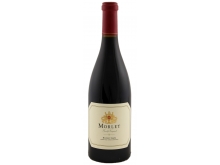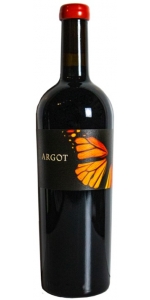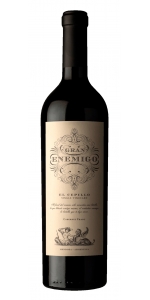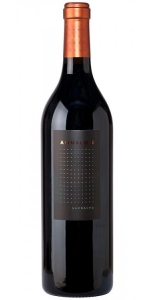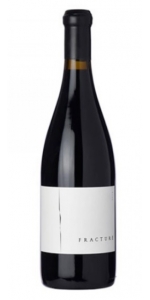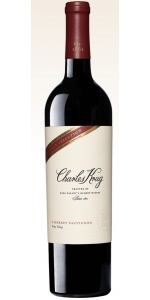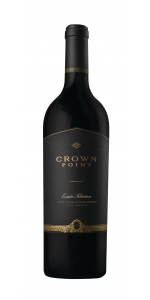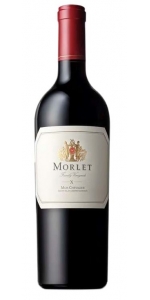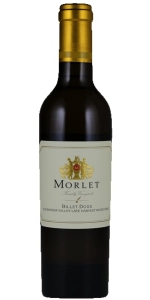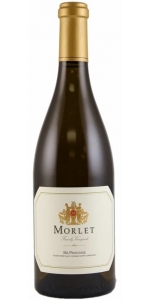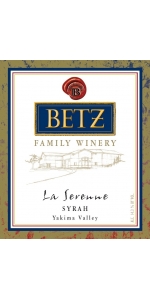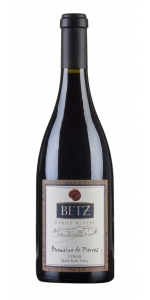Often described as a Booker flagship, Fracture is one of the world’s great Syrah's. Only the softest Syrah in barrel makes the cut for this dense and powerful wine. The namesake pays homage to the calcareous soil in our vineyard, the limestone causes it to ‘fracture’. Deep and mysterious at first sight, the 2018 vintage is rich and velvety on your palate. There is an interesting balance of earth and fruit, with traces of sweet beets, dark plums and chocolate. Though this silky wine will pair with anything, our thoughts are going to salty popcorn by the fire or Dutch Gouda cheese with some black truffle mustard.
Morlet Family Vineyards Bouquet Garni Syrah 2018
3 bottles with free shipping for: $345.00
6 bottles with free shipping for: $660.00
12 bottles with free shipping for: $1,200.00
| BUY MORE! SAVE MORE! | ||||||||||||||||||||
|
| Country: | United States |
| Regions: | California California (Sonoma County) |
| Winery: | Morlet |
| Grape Type: | Syrah |
| Vintage: | 2018 |
| Bottle Size: | 750 ml |
Intense violet, hints of lavender, black cherry, fresh leather and spicy flavors (white pepper and clove), rich and concentrated with a lingering spicy finish. Will age gracefully for several decades.
Review:
Morlet doesn’t make much of it, but their Syrah is beautiful and well worth seeking out. The 2018 Syrah Bouquet Garni comes from the cool climate, higher elevation Bennett Valley in Sonoma and offers a big, exotic nose of blackberry and blackcurrant fruits as well sandalwood, dried flowers, new leather, and white pepper. The fruit is ripe and opulent, yet it still holds onto loads of classic cooler-climate Syrah gaminess and peppery notes. Full-bodied on the palate, it’s balanced and has a lively, clean texture, beautiful depth of fruit, and a great finish. Enjoy bottles any time over the coming decade.
-Jeb Dunnuck 97 Points
Beginning with the 2006 vintage, Luc & Jodie Morlet have been handcrafting vins de terroir and unique cuvées of Cabernet Sauvignon and Cabernet Franc from their estate vineyards in Napa Valley as well as Chardonnay and Pinot Noir from the Sonoma Coast. The sought-after portfolio also includes a Pessac-Léognan-inspired white Bordeaux-style blend from Sonoma County. Meticulously farmed vineyards and low-intervention winemaking techniques produce powerful yet refined wines. By taking old world principles and adapting them to California, the Morlet style results in wines which are harmonious in their intensity, richness, complexity and refinement. It is this notion of harmony that inspired their logo, based upon 19th century French artist Mathurin Moreau’s sculpture entitled, ‘Harmonie.’ The Morlet wines clearly display personality, seamless character and graceful aging capability
Luc and Jodie restored a pre-Prohibition winery, built in 1880, as a gravity-flow winemaking facility. The historic estate is just north of the charming town of St. Helena. This 6-acre hillside vineyard supplies the premium Cabernet Sauvignon for their ‘Morlet Estate’ label, designated as the prestigious St. Helena Appellation. The highly acclaimed ‘Force de la Nature’ and ‘Cœur de Vallée’ wines hail from Luc and Jodie’s Cabernet Franc and Cabernet Sauvignon vineyard, situated in the world-renowned Oakville appellation and bordering the To Kalon Creek
On the foothills facing the western slopes of Mount St. Helena, Luc and Jodie’s Knights Valley vineyard provides the fruit for their ‘Mon Chevalier’ Cabernet Sauvignon. The warm and windy climate is ideal for the long ripening of the five Bordeaux varietals. In addition to their family-owned vineyards, they also direct the farming under long-term contracts on vineyards located in the Russian River Valley, Bennett Valley, Alexander Valley and Fort Ross-Seaview on the Sonoma Coast.
Aged exclusively in French oak barrels from selected artisan coopers, the wines are bottled unfined and unfiltered. Unwavering commitment to quality leads to small yields, attentive sorting, and the highest standard when blending. Thus, a very limited amount of each wine is ever produced.
Luc and Jodie also import ‘Pierre Morlet Champagnes’ which have been handcrafted by Luc’s family in France for five generations. Named after Luc’s grandfather, these award-winning Champagnes come solely from the designations of either Grands Crus or Premiers Crus. The deep, chalky subsoil and temperate microclimates of these hillside vineyards provide wonderful growing conditions for both Pinot Noir and Chardonnay grapes. A rarity in Champagne, the tradition of barrel fermenting and aging continues to be honored, adding complexity and uniqueness to the wines. The multi-vintage ‘Grande Réserve’ and ‘Rosé’ as well as the vintaged ‘Millésime’ are available by contacting the winery in St. Helena.
A dramatic, ridgetop landscape — rising 1500 feet above Lake Hennessey, staring west over Pritchard Hill — persistently influenced by a push/pull draw between The Valley’s floor and Lake Berryessa. This wild, untamed, eastern frontier of Napa Valley, produces singular, terroir-driven wines of captivating beauty, power and lift. An unseasonably wet and cool springtime produced significant shatter at Sage Ridge in 2019, reducing our yields by 50%, leading to a particularly flamboyant edition of this wine.
An incomparable expression of Cabernet Sauvignon — massively pure red fruit character, delivered on a ribbon of ultra-suave tannins and gorgeously seductive high tones. The palate never relents its come-hither posture. Aromatically, puts forth an intriguing botanical complexity that is unmistakably site-specific. As our experience with this one-of-a-kind terroir deepens, we remain endlessly excited for the potential of these unique ridgetop vineyards. Get your hands on a bottle and pull the cork…a wine built for immense near-term gratification.
Review:
"Deep garnet-purple colored, the 2019 Cabernet Sauvignon Sage Ridge Vineyard opens with open-knit notes of plum preserves, baked blackberries and boysenberry jam, leading to a core of crème de cassis, mocha, camphor and Indian spices with a touch of unsmoked cigars. The palate is full-bodied, concentrated and dense with black fruit preserves, framed by soft tannins and seamless freshness, finishing very long and very spicy. Only 75 cases were made. - Lisa Perrotti-Brown"
- Robert Parker's Wine Advocate (November 2021), 95 pts
Enemigo El Enemigo Gran Enemigo is made from 100% Cabernet Franc.
In the spectrum of people who pay attention to detail, winemakers are often incredibly detail-oriented. This can sometimes spill over to become an internal battled, and, as Alejandro Vigil and Adrianna Catena state, "We are our own worst enemy." El Enemigo pays homage to this internal struggle.
The nose presents sweet aromas of black ripen fruits with hints of vanilla and chocolate, which appear after the oak ageing. The mouthfeel is sweet with structured, persistent tannins due to the natural acidity of this wine, leading into an excellent long finish.
Review:
The nose of the 2018 Gran Enemigo El Cepillo Single Vineyard, from a low-yielding and drier year, is full of curry, a note that was a constant across the three vintages I tasted together, but it tends to be stronger in low-yielding and dry years like this. It's also floral and comes through as aromatic and a little exotic, in a good way, with elegance, persistence and very pure flavors. It has fine-grained tannins, great acidity and balance. 7,200 bottles. All these single-vineyard bottlings mature in ancient 4,000-liter oak foudres for some 15 months.
-Wine Advocate 97 Points"Pretty and inviting on the nose with gorgeous aromas of floral violet, cassis and completed with a lifted, delicate liquorice note. The palate is graced with deep herb, pepper, crunchy red fruit and graceful, silky tannins."
-Decanter 97 Points
Bodegas Alto Moncayo Aquilon Garnacha is made from 100% Garnacha.
The wines of Alto Moncayo are crafted to express the unique terroir of windswept high elevation Campo de Borja DO; and to serve as a benchmark for world class Old Vine Garnacha.
Aquilón is "The jewel in the Crown" a selection of the best barrels from the best lots. The vines are 60-100 years old.
Review:
This garnet-colored wine offers aromas of black currant, black raspberry and black licorice, with just a touch of charcuterie. The fruit flavors shine through with subtle notes of crushed violet. It has soft tannic structure, with a pleasant bit of grippiness in the post palate as it leads up to the long, long, finish.
-Wine Enthusiast 95 Points
About the Vineyard
Vineyards in Tabuenca and Borja, planted with indegenous clones of Garnacha starting in the 1920s.
Wine Production
The selected highest quality grapes are placed into small stainless-steel tanks of 7 tons capacity. The must is basket pressed and fermentation is finished in new French and American oak where it complets the malolactic fermentation. Wine is aged in the barrels for 24 months before bottling.
Tasting Notes
Appearance: Very deep red, scarlet rim
Aroma: Minerals and vanilla. Hints of raisins and dark Chocolate
Palate: As typical of the vintage, power and intensity with disarming elegance.
Food Pairing:
Goes well with beef, pork, game based stews and rice dishes.
Booker Fracture is made from 100 percent Syrah.
Review:
The 100% Syrah 2019 Fracture comes all from the Booker Estate Vineyard and is another pure, balanced, incredibly classy wine from this estate. Loads of darker fruits, ground black pepper, crushed stone, and scorched earth give way to a medium to full-bodied, powerful, concentrated Syrah that will benefit from 2-4 years of bottle age and cruise for 10-15 years.
-Jeb Dunnuck 97 Points
Dark purple. An exotically perfumed, expressive bouquet evokes ripe black and blue fruits, Moroccan spices, olive paste, licorice, potpourri and incense. Densely packed and impressively energetic in the mouth, offering intense blackberry, cassis, kirsch, fruitcake and floral pastille flavors that firm up slowly through the back half. The floral and spice notes repeat emphatically on an impressively long, youthfully tannic finish that leaves smoky mineral and licorice notes behind.
-Vinous 97 Points
Charles Krug Peter Mondavi Family Vintage Selection Cabernet Sauvignon is made from 100 percent Cabernet Sauvignon.
Review:
The 2016 Cabernet Sauvignon Vintage Selection has a deep garnet-purple color and features exuberant notes of crushed black cherries, mulberries and blackcurrant cordial with touches of unsmoked cigars, menthol, yeast extract and pencil shavings. Full-bodied, concentrated and opulent in the mouth, it has a solid line of plush tannins and plenty of backbone freshness to lift the generous fruit to a long fruity finish.
-Wine Advocate 95 Points
Crown Point Estate Selection is made from 75% Cabernet Sauvignon, 10% Merlot, 6% Petit Verdot, 6% Cabernet Franc, 3% Malbec.
The 2016 Crown Point Estate Selection exhibits a heady aromatic array of baking spices, ripe red and black fruits, with deep intonations of earth and minerals. The palate is elegant and bright, with appealing acids and nuanced notes of savory mocha and dried herbs. Polished and seamless, the tannins finish with a comet-like trail of textural opulence highlighted by glossy flavors of baked berry pie and warm toast. Recommended drinking window: now through 2030s.The 2016 Estate Selection is representative of all five red Bordeaux varieties. The selection process starts in the vineyard and continues on through the winemaking process: only the best lots make the final blend. All blocks were harvested & fermented separately. The individual components were blended after 12 months in barrel. Total time in 225 liter French oak barrels was 26 months.
Review:
Deeply colored, the 2016 Estate Selection checks in as 75% Cabernet Sauvignon, 10% Merlot, 6% Petit Verdot, 6% Cabernet Franc, 3% Malbec that was brought up 26 months in 75% new French oak. Deeply colored, it has a smoking good bouquet of crème de cassis, smoke tobacco, lead pencil, camphor, and hints of chocolate. This gives way to a powerful, opulent Cabernet Sauvignon that has plenty of sweet tannins, a layered, multi-dimensional texture, no hard edges, and an awesome finish. I’d happily put this beauty in a lineup of top Napa Valley Cabernet Sauvignon and blends.
-Wine Enthusiast 97 Points
There’s an impressive amount of complexity on the nose of this bottling by winemaker Adam Henkel, from crushed graphite and concentrated black strawberry to cinnamon pastry, licorice and a brush of herbs. The sip is intense, with leathery but chiseled tannins presenting flavors of charred black currant, licorice, black olive, dried flower and white pepper
-Jeb Dunnuck 97 Points
Morlet Family Vineyards Mon Chevalier Cabernet Sauvignon is made from Cabernet Sauvignon (86%) Cabernet Franc (8%) Merlot (3%) Malbec (2%) Petit Verdot (1%) .
Located on the hillsides of Knights Valley, near Calistoga, this vineyard benefits from its proximity to Mount St. Helena, whose warm and windy climate is ideal for the long ripening of the Bordeaux red varietals. Handcrafted by using classical winemaking techniques, this special wine is dedicated to our son, Paul Morlet.
Dark red with a hue of purple. Intense and complex bouquet of red, black and blue berries intermixed with notes of blueberries, minerals (graphite, wet river rocks) licorice, fresh blond tobacco and a hint of lavender. Full bodied, the palate is reminiscent of the nose, with a richly tannic yet round frame and a great intensity. The hillside tannins and the classical aromatic complexity create a harmonious ensemble, leading to a very long and elegant finish. Built to age for decades, this collectible wine opens up after a few years of cellaring and is particularly representative of this special vineyard from the hillside of Knights Valley. Mon Chevalier features the interaction of the loamy, well drained and rocky volcanic soil, the typical sunny mountain climate and the low-interventionistic Morlet winemaking approach.
Property Name: Mon Chevalier
Name Meaning My Knight Named after our son, Paul Morlet
Type of wine Vineyard designated
Appellation Knights Valley
Vineyard singularity Morlet Family Estate Hillside 1100-1200 feet elevation Rhyolitic, loam & volcanic ash
Typical harvest date End of October
Picking Manual, small lugs, refer truck
Sorting Cluster by cluster, berry per berry
Fermentation Through native yeast Tank and Puncheons
Upbringing 16 months French oak from artisan coopers
Bottling Unfiltered
Cellaring time Decades
Serving Room temperature
Decanting recommended
Review:
The 2018 Cabernet Sauvignon Mon Chevalier comes from the Knights Valley, just north of Napa Valley in the larger Sonoma County, and it always seems to me to have one foot in Napa and one foot in Sonoma. Boasting a similar ruby/purple color (as do all of the releases here), it’s slightly more reserved and stately (knightly, if you will), with building aromas and flavors of blackcurrants, toasted bread, dried violets, baking spices, and loamy earth. These carry to a pure, full-bodied, multi-dimensional Cabernet that’s flawlessly balanced, has ripe yet certainly present tannins, a notable sense of minerality, and a great, great finish. It’s just another incredible wine from Luc Morlet that can be drunk today with ample pleasure or cellared for 20-30 years if, for some reason, you feel the need to delay gratification.
-Jeb Dunnuck 99 Points
Morlet Family Vineyards Billet Doux Late Harvest Semillon 2012 (half-bottle) is made from Sémillon (65%) Sauvignon Blanc (31%) Muscat à Petits Grains (4%)
rowing in the gravelly soil of an ancient riverbed in the beautiful Alexander Valley, the old vines benefit from hot afternoons and cool, foggy mornings, favorable for the development of Botrytis (Noble Rot). Extremely small yields in the Sémillon, Sauvignon Blanc and Muscat vineyards lead to the immensely concentrated fruit. Just as one receives a note from one’s sweetheart, we present this wine as a precious ‘Love Note’ or ‘Billet Doux.’
Deep crystal clear gold. Intense and complex bouquet of dry apricot, pêche de vigne and Reine Claude yellow plum intermixed with notes of quince, honey, Muscat and a hint of sweet vanilla. Full bodied, the palate is reminiscent of the nose, with a creamy sweet texture and a great intensity. The large amount of sugar and glycerin creates a highlighted viscosity. Along with the wine’s great concentration, richness and opulence, the classical aromatic complexity reveals a flamboyant yet harmonious ensemble, leading to a very long, complex and smooth finish.
Proprietary name ‘Billet Doux’
Name meaning Love Note
Type of wine Late harvest white wine
Appellation Alexander Valley
Vineyard singularity 25-60 year old vines Loamy and gravelly soils from an ancient river bed One cluster per shoot ‘de rigueur’
Typical harvest date November Picking Manual, small lugs, refrigerated truck
Sorting Cluster by cluster
Fermentation In barrel through native yeast
Upbringing 16 months French Oak from selected artisan Coopers
Bottling Unfined, filtered to prevent Malolactic
Cellaring time Decades
Serving Chilled and decanted
Review:
Produced from 65% Sémillon, 31% Sauvignon Blanc and 4% Muscat, the 2012 Billet Doux has a medium golden color and profoundly scented nose of beeswax, honeyed nuts, orange marmalade, Manuka honey and preserved lemons. Full-bodied, full-on sweet, rich, concentrated and oh-so-unctuous, it delivers powerful flavor layers and epic length. 175 cases were made.
-Wine Advocate 97 Points
Morlet Family Vineyards Mon Chevalier Cabernet Sauvignon is made from 94% Cabernet Sauvignon 6% Cabernet Franc .
Located on the hillsides of Knights Valley, near Calistoga, this vineyard benefits from its proximity to Mount St. Helena, whose warm and windy climate is ideal for the long ripening of the Bordeaux red varietals. Handcrafted by using classical winemaking techniques, this special wine is dedicated to our son, Paul Morlet.
Dark red with a hue of purple. Intense and complex bouquet of red, black and blue berries intermixed with notes of blueberries, minerals (graphite, wet river rocks) licorice, fresh blond tobacco and a hint of lavender. Full bodied, the palate is reminiscent of the nose, with a richly tannic yet round frame and a great intensity. The hillside tannins and the classical aromatic complexity create a harmonious ensemble, leading to a very long and elegant finish. Built to age for decades, this collectible wine opens up after a few years of cellaring and is particularly representative of this special vineyard from the hillside of Knights Valley. Mon Chevalier features the interaction of the loamy, well drained and rocky volcanic soil, the typical sunny mountain climate and the low-interventionistic Morlet winemaking approach.
Propietary Name Mon Chevalier
Name Meaning My Knight Named after our son, Paul Morlet
Type of wine Vineyard designated
Appellation Knights Valley
Vineyard singularity Morlet Family Estate Hillside 1100-1200 feet elevation Rhyolitic, loam & volcanic ash
Typical harvest date End of October
Picking Manual, small lugs, refer truck
Sorting Cluster by cluster, berry per berry
Fermentation Through native yeast Tank and Puncheons
Upbringing 16 months French oak from artisan coopers
Bottling Unfiltered
Cellaring time Decades
Serving Room temperature
Decanting recommended
Review:
The 2017 'Mon Chevalier' is rich, deep and unctuous, with all the character that makes wines from this site so exciting. Graphite, inky blue/purplish fruit, spice and lavender infuse the 2017 with tremendous complexity. In the glass, the 2017 is savory, rich and expansive, not to mention hugely appealing.
-Vinous 96 Points
Morlet Family Vineyards Ma Douce Chardonnay is made from 100 percent Chardonnay.
The cool maritime breeze and mild and sunny mountain climate create ideal conditions for this hillside vineyard located on the second ridge from the Pacific Ocean. Handcrafted using classical Burgundian winemaking techniques, this wine is dedicated to Jodie Morlet. It is ‘My Sweet’ or ‘Ma Douce.’
Full yellow color. Aromas of lemon drop, Crème Brulée and orange zest intermixed with strong notes of minerality (wet stones) and fresh hazelnut. Full-bodied, mineral driven, this wine displays a creamy texture and very long mineral finish. Built to age gracefully for a decade, this wine is already very approachable.
Propietary Name Ma Douce
Name Meaning My Sweet “Douce brize” from the Ocean
Varietal composition Chardonnay
Type of wine Vineyard designated
Appellation Fort Ross-Seaview
Vineyard singularity On the second ridge off Ocean High elevation Goldridge soil
Typical harvest date End of October
Picking Manual, small lugs, refer truck
Sorting Cluster by cluster
Fermentation In barrel through native yeast 100% Malolactic
Upbringing Sur lies with bâtonnage
French oak from selected coopers
Bottling Unfiltered
Cellaring time 5-10 years
Serving Slightly below room temperature Decanted when served young
Review:
"Lots of white peach, quince, white flower, and green almond notes emerge from the 2020 Chardonnay Ma Douce, a full-bodied barrel sample with beautiful depth as well as freshness."96 Points Jeb Dunnuck:
Betz Family La Serenne Syrah is 100% Syrah
La Serenne is the most reflective of the site/vintage dynamic of our three single-site 2012 Syrahs. Lovers of this wine know that its source, the Boushey Vineyard, is the highest altitude of the three vineyards and is typically the latest harvested. This cool site was accentuated by the cooler season and the results reflect the seriousness of this vineyard and its care.
An extraordinary, nearly impenetrable black purple color leads to a concentrated, inky aromatic impression: smoky black cherry and wild blackberry dominate, but a litany of supporting aromas is already emerging: smoke, violet, mushroom, roasted meat, Chinese 5 spice and minerals. It has a full attack on entry and a big, rich mouthfeel that goes on and on.
Review:
Aromas of blackberries, black raspberries, violets, black and white peppercorns and stones. It’s medium-bodied with fine, tightly knit tannins. Seamless and transparent with a silky texture. Very bright and pure with layers of wild berries and minerals. Tar and dark tobacco, too. Drink or hold.
-James Suckling 95 Points
Betz Family Domaine de Pierres Syrah is made from 100% Syrah.
With our long history of making single site syrah's in Washington, it made sense for us to venture into the Rocks District of Milton Freewater in the Walla Walla Valley to bring you our newest syrah, "Domaine de Pierres."
The Rocks AVA produces syrah that shows a distinct character, separating it from any other site in Washington State. One thing in particular that has drawn people here is the gallet stones present throughout the valley. They are very similar to the pudding stones that are found in Châteauneuf-du-Pape, and can be anywhere from golf ball size, to softball size or larger. Since we purchased the vineyard in 2014 we have been tilling the earth multiple times every season to expose these rocks. The gallet stones act like a heat sink, giving a little extra push to help ripen syrah in an area with marginal heat accumulation.
In the glass, Domaine de Pierres stands out from our other syrah's because of its incredibly savory profile. Notes of roasted meat, fresh herbs, olive tapenade, tobacco and graphite are supported by dark fruit, espresso, and lavendar. The wine has a lower acidity and higher PH than our other wines, which contributes to a velvety, full bodied mouthfeel. Even in the cellar, we immediately noticed a difference in the color, aromatics and flavor that these syrah grapes were able to express.
The other big reason that we are so excited about the wine from this particular AVA, is that the history of the Rocks is happening right now! Our vineyard, “Ancient Stones,” has only been planted there since 2007, and the beginning of the Rocks as a wine growing region only really started in the 1990's. There is a lot of energy and exploration going on, and it has been a fun experience for our team to be a part of it. We still have so much to learn about this region and it is very exciting to feel like we are on the upward swing!
Review:
"This red offers a steely core of crushed rock and vibrant acidity framed by handsome blackberry, cherry, green olive and licorice flavors that build tension toward medium-grained tannins. The name of this wine—French for "Field of Stones"—is apt. Drink now through 2032. - Tim FISH."
- Wine Spectator's Insider (July 6th 2022), 94 pts
- back
Opus One 2022 is made from 80% Cabernet Sauvignon, 8% Petit Verdot, 6.5% Cabernet Franc, 5% Merlot, 0.5% Malbec
Opus One 2022 exudes charm and sophistication from the glass. Primary aromas of blueberry, cassis, and dried rose petals with underlying notes of olive, cigar box, and graphite create a rich and inviting bouquet. On the palate, bright red-fruit flavors, cocoa, and fresh orange peel waltz together into a harmonious and balanced profile. Long and elegant, the finish delivers touches of wet stone, vanilla, and a hint of coffee. Fine-grained tannins and juicy ripeness signal the promise of a long future in the cellar.
Review:
Chocolate, cherry and rose petal aromas on the nose. Very open and alive - this has a great energy from the aromatics alone with soft cedar shavings, vanilla bean and bramble fruit. Juicy and lively, this is full of fun - fruity and concentrated. The tannins are just wonderful, creamy and slightly grippy, extending the flavours vertically. Tons of juicy, succulent fruit - this feels quite modern but still with that flash of sunshine and ripeness. Long lasting with purity and delicacy that make it so enjoyable. A wonderful creation from Michael Silacci. This is not your typical blockbuster at all, this is a darling of a wine. 0.5% Malbec completes the blend. The Opus team chose to pick early and quickly given the heat spikes in 2022, starting with the Merlot on 24th August. Ageing 18 months in French oak.
-Decanter 97 Points
Thorn Clarke Single Vineyard Grenache is 100% Grenache.
The Single Vineyard Selection range focuses on single site, small batch wines, highlighting the true characteristics of each individual variety. Each block is hand selected by our winemaker and viticulturist each year, choosing the wines that best reflect the strengths of each individual vintage.
The vines sit in good sandy soils nestled below the ranges on the eastern side of the Barossa, enjoying cooling evening, gully winds and a temperature climate.
The wine is ruby in color with purple hues. Brimming with bright fruit notes of wild strawberries & cherry and backed up by subtle spice of white pepper. On the palate, the fruit continues with further notes of raspberries and plum with a hint of French oak. A juicy medium bodied red that has a delicate and complex finish.

